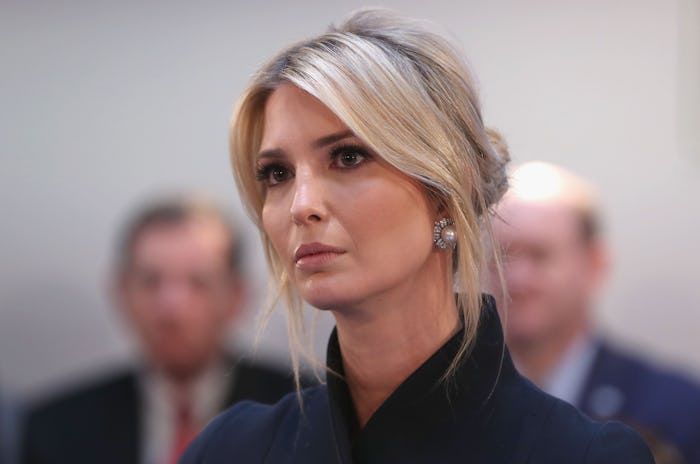News

Why Ivanka Trump's Child Care Plan Is "Flawed," According To An Expert
Affordable, reliable child care remains a seriously troubling issue in the United States. Parents are desperately trying to work to support their families, but in order to do that, they need to have access to child care that won't completely empty out their bank accounts or have them worrying themselves sick every waking moment. The White House appears to be finally acknowledging this crisis, with the proposed budget expected to call for increased spending in that area, thanks to Ivanka Trump. While that sounds like good news, an expert who spoke with Romper explains that Ivanka Trump's child care plan is "flawed," and it ultimately ends up acting as little more than a band-aid solution that will not end up fixing much in the end.
Earlier this week, NPR reported that the proposed child care plan from Ivanka Trump, presidential adviser and daughter of President Donald Trump, asks for a one-time payment of $1 billion towards child care in communities that are struggling. States are able to apply for the funding and offer it to employers to invest in child care and incentivize child care providers, according to Jezebel.
As the First Daughter explained during a meeting at the White House, as NPR reported: "You have care providers who are working at below poverty wages, you have parents who can't afford the care and you don't have a robust ecosystem of facilities because it's a low-margin business with high liability. So, it's like just a fundamentally flawed system."
A system she aims to fix with a $1 billion one-time payment.
According to Elaine Weiss, former national coordinator of the Broader Bolder Approach to Education, Ivanka Trump's plan is "very flawed in several key respects."
How? As Weiss explains to Romper, "The proposed $1 billion, one-time infusion does far too little to fix a national problem that will require a much larger and sustained investment. The requirement that states apply, with only some receiving funding, means that we will continue so suffer from a patchwork non-system in which the most vulnerable children in many states lack access to quality, affordable care."
Child care remains incredibly expensive for parents; in fact, a 2018 survey by The New York Times found that 64 percent of respondents listed expensive child care as their main reason for not wanting children, according to CNBC. The most expensive place for child care is Washington, D.C., with parents spending $22,631 per year as of 2015. Yet despite the high cost of child care, providers tend to make very little money, an average of $9.60 per hour, according to Chron.
Weiss also tells Romper that "Trump's suggestion that states compete on the basis of removing regulations makes no sense; the type of rule to which she refers is usually a local, not state, decision, and those requirements have little, if anything, to do with the cost of care."
Professor Sonya Michel of the University of Maryland, an expert in child care issues, concurs with Weiss. As she told Jezebel, "It looks like window dressing. There are a lot of problems with it... As it is, childcare regulations are very lax... Anything that reduces regulation, I would be very suspicious of."
It should be noted that another child care proposal was introduced by Democratic Sen. Elizabeth Warren, who's running for president, in an article she wrote for Medium recently — the Universal Child Care and Early Learning plan. Warren's plan would:
- See federal governments working with local providers of all kinds to create a child care network
- Allow local communities to be in charge but ensure that the child care providers met a high national standard of care
- Pay child care providers and preschool teachers the same as elementary school teachers
How exactly does Warren hope to fund this plan? She plans to tax multimillionaires for the service, according to Fortune.
Weiss tells Romper that Sen. Warren's proposal "is a sensible, evidence-based plan that addresses the three key aspects of our current crisis: lack of access to affordable care for the majority of US families, lack of reliable, quality care and early education for many US children, and poverty wages for too many providers."
Ivanka Trump might have the right idea when it comes to ensuring affordable child care remains a part of the national conversation, but her proposed one-time payment simply won't cut it. It's a complicated issue that requires a thoughtful, long-term fix.